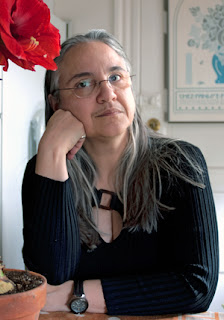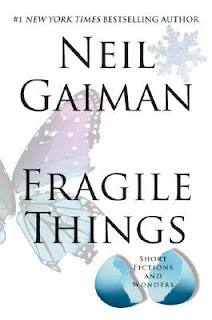Have you heard that Titan Books are re-releasing Freda Warrington's vampire series, the wonderful
Blood Books, beginning with
A Taste of Blood Wine and leading up to a brand new book in the series? Today I'm really excited to be a host in the “
Gorgeous Grave-throbber” Tour, with the second part of one of Freda's related short stories!
From award-winning British fantasy author Freda Warrington, A Taste of Blood Wine (Titan Books, May 2013) is the first novel of a gothic vampire melodrama.
To celebrate the return of the critically acclaimed Blood Books in collectable paperback and e-book edition, Titan Books and Freda Warrington are serialising two rare and risqué stories set within the universe of the Blood Books across a series of websites and blogs.
This is part two of
And Their Blood Will Be Prescient to Fire, and you can
read the rest of the tale here. Hope you enjoy it!
And Their Blood Will Be Prescient to Fire: Part 2
by Freda Warrington
---
Robyn. Seventy years lost. Violette, who thought she couldn’t love, had loved her. Perhaps she’d come close with others since, but Robyn was the ruby set in her heart. A glorious courtesan defying Boston’s high society; a wounded soul, beautiful, warm and funny. The miracle was that Robyn had wanted her too. But Violette had turned her away. Robyn, if I let you come with me… I will destroy you.
It had seemed the right decision at the time.
Violette was hardly aware of her surroundings. She could only see Robyn’s face, smell her hair. Charlotte’s voice startled her.
‘Where are you going?’
‘To speak to her.’
Charlotte’s hand shot out and circled her upper arm. ‘Don’t.’
‘Do you think a day goes by that I haven’t longed to find her again?’ Violette hissed. ‘Let me go.’
Too much liquid swam in Charlotte’s eyes. Fear, jealousy. ‘Violette, it isn’t Robyn.’
The dancer plucked Charlotte’s hand off her arm and pushed it away. ‘Let me go. Whoever she is, at least let me look at her face again for a few minutes.’
The main lobby of the hotel was bright, sparkling with huge chandeliers. From the marshmallow comfort of a sofa, Violette watched the woman pacing, talking into a mobile phone, high heels clicking on the marble floor. At last she ended the conversation, turned and saw Violette.
‘Hi again,’ she said, about to walk straight past. Violette sat forward and made brazen eye contact, her posture demanding conversation. With those brilliant kohl-ringed eyes she could convey emotion to the back of the stalls. The effect on the woman was virtually physical. She halted, bemused as if Violette had tripped her.
‘Hi,’ said Violette. ‘Is your evening going as well as mine?’
‘Oh, my dinner date stood me up. Migraine, sure; too many brandies at lunch is more like it.’
‘Same here,’ said Violette. ‘That is, my friend was called away. Ordered this bottle, and now no one to drink it with.’ She indicated Stefan’s demon-brew, which she’d seized and brought with her. The thick green glass of the bottle glistened. There were two fresh glasses beside it. ‘I’d love it if you’d help me out.’
Despite the cool poise of her exterior, Violette was trembling inwardly like a teenager. Her approach felt inane and desperate. The desire to keep this gorgeous, distracted stranger beside her was turning her into a fool.
‘Oh, sure, why not.’ The woman flopped down, stretching stockinged calves. She took out a palmtop computer and began tapping at it, at the same time trying to keep the folder from sliding off her knee. Violette, hypnotised, watched Robyn’s warm face with its mischievous dark eyes, Robyn’s unruly thick hair falling forward and being pushed back. ‘It’s such a damn nuisance… hope the guy’s okay for a working breakfast… Oh, and my sister’s picking me up at nine… Damn, I need to email Mark; that’s my husband…’
Violette had a vision of breaking into a strange house and sucking the life from a faceless man. No more husband. She poured syrupy straw-gold plasma into the woman’s glass.
‘What do you do?’ she asked softly.
‘What? Oh, pharmaceutical company. Really dull.’ The woman flipped the palmtop shut and into her purse. ‘Sorry, I’m not normally this rude. You so don’t look part of the convention, and you’ll turn out to be head of some huge corporation and I’ll have blown a billion-dollar deal.’
‘Relax. I’m not.’
‘I’m Ruth Sarandon.’ She reached out and shook hands, her fingers warm in Violette’s cold ones.
‘I read the name tag.’
‘You’re not wearing one,’ said Ruth. She took the glass. There was no sign of Robyn’s calm, sensual personality beneath the brittle energy.
‘I’m Violette.’ She didn’t think to offer a false name.
‘Well, cheers, Violette.’ The dancer watched as Ruth-Robyn took a mouthful of blood plasma. She swallowed hard, eyes watering. ‘Wow, that’s different. Kind of bitter, like an aperitif. Not bad.’ She turned the bottle, holding it by the neck. ‘No label. That’s scary.’
‘It peeled off. Condensation.’ Usually Violette dealt in the truth. Tonight it felt all too easy to spill one lie after another. The spiked blood made her unguarded and she was floating in a dream where all that mattered was what she wanted.
‘So, what brings you to Boston?’ Ruth asked. She took large mouthfuls of her drink, shuddering a little with each one. Violette looked at the chestnut hair lying against her throat.
‘Oh… working trip,’ she began, but Ruth sat forward, speaking over her.
‘You know, you look incredibly familiar. Did you say your name was Violette? Are you a ballet dancer?’
Violette bit her lip, cursing inwardly. She felt the magic bleeding away. The chatter of people in the lobby became deafening. She shrugged, gave a self-effacing smile. ‘I’m off-duty.’
‘You’re
the Violette Lenoir, right?’ Ruth put down her drink and clapped her hands. ‘Oh, my God, my little sister worships you. She will
die if she knows I met you.’
Violette’s eyes widened. She had an image of a small girl, like a child in an Edward Gorey cartoon, literally expiring in the face of her big sister’s news. Meanwhile Ruth’s chatter went on: ‘I say little; Sarah’s twenty-three. Oh, her room’s a shrine, she has every one of your ballets on DVD, she truly spends every cent of her wages on you…’ and Violette sat transfixed by dismay. This was the last thing she wanted. She wanted Robyn, the wordless bliss of finding each other again. Not the inane flutter of a stranger. She wanted Robyn so badly the feeling pushed tears into her eyes.
She drank down the herb-fragrant blood. It gelled inside her like disappointment. She let the words wash over her until she couldn’t hear them any more. The world was buzzing madly around her, speeded up in time while she sat utterly still. No longer seeing the babbling woman there, only seeing Robyn.
She became aware that Ruth had stopped and was staring uneasily at her. ‘So – I guess an autograph’s out of the question? For Sarah, not me.’
‘Forgive me.’ Violette’s attempt at graciousness sounded wooden. ‘It’s wonderful that your sister… To know my work’s not in vain.’
‘I’m sorry,’ said Ruth. ‘You must get this all the time. Another gushing idiot, and here you are trying to relax. I’ll stop.’
Her voice had an edge suggesting disapproval of stars who weren’t meltingly grateful to their fans. Violette didn’t care. She leaned into the sofa, her body turned towards Ruth’s, one hand supporting her head and the other resting lightly on her hip.
‘Actually, I’m trying to pick you up,’ Violette said coolly, not blinking. ‘Can we please go to your room before everyone in this bloody hotel recognises me?’
---
Read the rest of the short story,
And Their Blood Will Be Prescient to Fire, here. And don't forget to hop over to
The Curiosity of a Social Misfit for part 3!
Thanks Freda Warrington and Titan Books. I'm so looking forward to reading the book! :-)
The first book in Freda Warrington’s Blood Books
series, A Taste of Blood Wine
, is out now from Titan Books, £7.99.



















